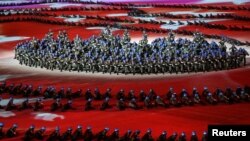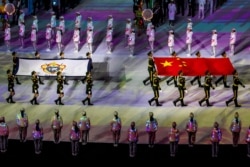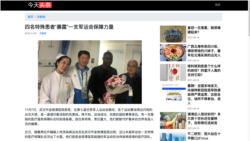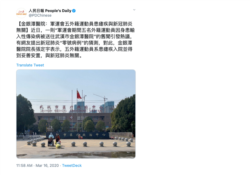On August 11, Chinese state-run CCTV ran a report suggesting that American athletes participating in the 2019 Military World Games in Wuhan, China may have introduced COVID-19 to the country.
The games were held in October 2019 and attracted 9,308 athletes from around the world, including more than 280 competitors and staff from the United States.
“During (the Military World Games 2019), five U.S. military contestants developed symptoms of infectious diseases such as fever, coughing and diarrhea and were rushed to Jinyintan Hospital, a famous infectious disease hospital in Wuhan,” the CCTV report claimed.
The CCTV report resurrected an old conspiracy theory – one that even Chinese media and a top health official have rejected.
To be sure, reports have surfaced that foreign athletes fell ill with COVID-19-like symptoms, prompting calls for an investigation from congressional Republicans to determine if the Military World Games 2019 was a "superspreader event."
But the case of those five individual athletes, none of whom were ever identified as U.S. citizens, was previously covered in Chinese media.
No evidence has ever been provided to support allegations that sick U.S. personnel at the games brought COVID-19 to Wuhan, seeding the global pandemic.
COVID-19 infections were first reported in Wuhan in December of 2019. The origins of the virus that causes the disease are uncertain, but that hasn’t stopped Chinese media and officials from trying to blame the United States.
On February 23, 2020, Zhang Dingyu, director of Wuhan Jinyintan Hospital, confirmed to China’s Southern Weekly newspaper that five foreign athletes suffering from malaria had received treatment at the hospital. He said the incident “had nothing to do with COVID-19.”
“This doesn’t even deserve debunking,” Zhang told the Southern Weekly.
Zhang’s credibility within China is well-established.
In September 2020, Zhang was awarded "the People's Hero,” one of the highest honorary national titles, by Chinese President Xi Jinping for “his outstanding contributions to the country's fight against the COVID-19 epidemic.”
CCTV’s report claimed “the preliminary diagnosis was malaria,” but then noted that malaria “only exists in places with extremely poor hygiene conditions such as Africa.” The report questioned how U.S. soldiers could get it.
CCTV correctly noted malaria is “basically extinct” in China, which received malaria-free certification by the World Health Organization this past June.
As the Sars-CoV-2 virus that causes COVID-19 had not yet been identified, the possibility the athletes were misdiagnosed remains. However, local media reported at the time that two of the five sick athletes were from Africa; the nationalities of the other athletes were not mentioned. Furthermore, no mention was made of American athletes.
The official website of Jinyintan Hospital reported on November 4, 2019 that local health officials had visited two athletes from Africa who were treated for malaria at the hospital. In one of the pictures, "Nigerian Army" is visible on the athlete's black and red jacket.
CCTV claimed, without providing any evidence, that the U.S. military scrambled planes to pick up the sick athletes and return them to the United States for treatment two days before others left the games.
But according to the local reports, two of the athletes expressed appreciation to the hospital staff and their treatment, seemingly contradicting the claim anyone was medically evacuated to another country. Medical records and passport information for the five athletes has never been presented.
On March 16, 2020, the Chinese Communist Party-run People’s Daily tweeted about Zhang Dingyu’s dismissal of the conspiracy theory.
Chinese social media users mockingly asked: “[D]id the People’s Daily just slap [foreign ministry spokesman] Zhao Lijian in the face?
Zhao had earlier spread the military games conspiracy theory, tweeting on March 12, 2020:
“CDC was caught on the spot. When did patient zero begin in US? How many people are infected? What are the names of the hospitals? It might be US army who brought the epidemic to Wuhan. Be transparent! Make public your data! US owe us an explanation!”
At that time, Maatje Benassi, a U.S. Army reservist who participated in the military games on the U.S. Armed Forces Cycling Team, was the target of online claims that she brought the virus to Wuhan.
Benassi said she had not experienced any symptoms of COVID-19.
Still, CCTV cited George Webb, who it described as “an investigative journalist,” in posting a video claiming that “an American athlete who participated in World Military Games in Wuhan in 2019 may have been the ‘patient zero’ that initially triggered the COVID-19 epidemic.”
In fact, Webb, who the Associated Press called “a for-profit conspiracy theorist in Washington, D.C.,” had doxxed Benassi after claiming in a video, without evidence, that she brought the virus from the U.S. Army’s bioresearch lab in Fort Detrick, Maryland to Wuhan.
Benassi then was serving as a community hospital security officer at Fort Belvoir in Fairfax County, Virginia, which is approximately 67 miles south of Fort Detrick.
Webb’s video circulated widely in China and was picked up by state-run Global Times. Benassi received death threats, and Webb’s video was pulled from YouTube. But the video was not taken down from the Chinese social media platform Weibo, where it has received millions of views.
CNN noted that Webb was unable to provide during an April 2020 phone interview "substantive evidence to support his claims about the Benassis.”
Webb has previously been caught peddling other unsubstantiated conspiracy theories, with very real-world consequences.
Still, the origins of COVID-19, and what was happening in Wuhan during the Military World Games 2019, remains open to speculation.
To begin, several athletes from Europe and North America did report COVID-19-like symptoms while participating in the games or returning home.
"[I got] very sick 12 days after we arrived, with fever, chills, vomiting, insomnia ... On our flight to come home, 60 Canadian athletes on the flight were put in isolation [at the back of the plane] for the 12-hourflight. We were sick with symptoms ranging from coughs to diarrhea," a House Republican Foreign Affairs Committee report on the Origins of COVID-19 cites a Canadian athlete as saying.
An updated version of that report released earlier this month by the top Republican Party member on the committee likewise stated that “athletes at the Military World Games became sick with symptoms similar to COVID-19.”
It continued: “Some of them carried the virus back to their home countries – creating one of the earliest super-spreader events in the world.”
Those assertions, however, remain unverified.
Republican Sen. Roger Marshall and Republican Rep. Mike Gallagher have reached out to the Department of Health and Human Services and Pentagon, respectively, in an attempt to establish whether any U.S. military athletes were potentially infected in Wuhan before returning to the United States, the Washington Post reported.
Pentagon spokesman John Kirby told the Washington Post he had no knowledge of U.S. troops falling ill with COVID-19 infections during the 2019 World Military Games.
Gallagher has asked the Pentagon, among other things, whether any of the U.S. military personnel were tested for COVID-19 antibodies, and whether any contact tracing was conducted once they returned to post stateside.
Scientists have posited that the novel coronavirus might have already been circulating in Wuhan by the time of the Military World Games 2019.
A British study published in the “Infection, Genetics and Evolution” medical journal in September 2020 posited that the pandemic may have started as early as October 6, 2019 – less than two weeks before the games in Wuhan.
That estimate was arrived at by studying the evolutionary development of the SARS-CoV-2 virus.
Update, August 23, 2021: This fact check has been updated to add information from Jinyintan Hospital's web site about treating African athletes for malaria.








